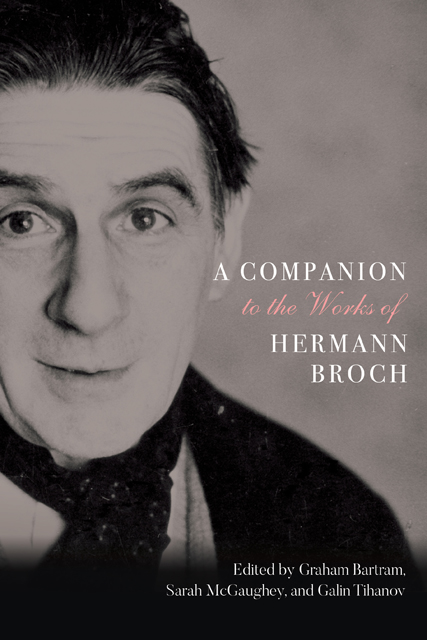Book contents
- Frontmatter
- Contents
- Preface
- Acknowledgments
- List of Abbreviations
- Introduction: Broch’s Life and Works
- 1 Perspectives on Broch’s Die Schlafwandler: Narratives of History and the Self
- 2 Hermann Broch and the Dilemma of Literature in the Modern Age
- 3 Interrogating Modernity: Hermann Broch’s Postromanticism
- 4 Broch and the Theater: Die Entsühnung and Aus der Luft gegriffen as Tragic and Comic Dramatizations of the Economic Machine
- 5 Limits of the Scientific: Broch’s Die Unbekannte Größe
- 6 Broch’s Die Verzauberung: Ludwig Klages and the Bourgeois Mitläufer
- 7 Hermann Broch’s Massenwahnprojekt and Its Relevance for Our Times
- 8 Human Rights and the Intellectual’s Ethical Duty: Broch’s Political Writings
- 9 Broch’s Der Tod des Vergil: Art and Power, Language and the Ineffable
- 10 From the “Tierkreis-Erzählungen” to Die Schuldlosen: The Creation of Broch’s Last Novel
- 11 Broch’s Legacy and Resonance
- Selected Bibliography
- Notes on the Contributors
- Index
11 - Broch’s Legacy and Resonance
Published online by Cambridge University Press: 20 January 2023
- Frontmatter
- Contents
- Preface
- Acknowledgments
- List of Abbreviations
- Introduction: Broch’s Life and Works
- 1 Perspectives on Broch’s Die Schlafwandler: Narratives of History and the Self
- 2 Hermann Broch and the Dilemma of Literature in the Modern Age
- 3 Interrogating Modernity: Hermann Broch’s Postromanticism
- 4 Broch and the Theater: Die Entsühnung and Aus der Luft gegriffen as Tragic and Comic Dramatizations of the Economic Machine
- 5 Limits of the Scientific: Broch’s Die Unbekannte Größe
- 6 Broch’s Die Verzauberung: Ludwig Klages and the Bourgeois Mitläufer
- 7 Hermann Broch’s Massenwahnprojekt and Its Relevance for Our Times
- 8 Human Rights and the Intellectual’s Ethical Duty: Broch’s Political Writings
- 9 Broch’s Der Tod des Vergil: Art and Power, Language and the Ineffable
- 10 From the “Tierkreis-Erzählungen” to Die Schuldlosen: The Creation of Broch’s Last Novel
- 11 Broch’s Legacy and Resonance
- Selected Bibliography
- Notes on the Contributors
- Index
Summary
In 1950—one year before his death—Hermann Broch was nominated for the Nobel Prize in Literature by some fellow European and American writers. According to an anecdote, the Nobel Prize Committee in Stockholm asked for advisory opinions and directed one of the requests for information to the Austrian Academy of Sciences in Vienna. The reply from Austria—so short that it fit on a postcard—said, in effect, that no one in Vienna knew of a writer by the name of Hermann Broch.
Three decades later, one of Hermann Broch’s Viennese friends, Elias Canetti, himself a generation younger, received the Nobel Prize in Literature. In his acceptance speech, Canetti paid tribute to those writers from the Austrian cultural orbit who had influenced him: Karl Kraus, Franz Kafka, Robert Musil, and Hermann Broch. Canetti emphasized that he was, as it were, accepting this highest of honors as a representative of these four authors, none of whom had been awarded a Nobel Prize. He meant this to be more than a kind gesture; it was out of reverence for writers who had barely received recognition in their own lifetimes, yet without whom a literary oeuvre such as Canetti’s would have developed in a different direction. It was Broch who initially made Canetti his protégé. As early as 1933, two years before the younger man’s debut novel, Die Blendung, was published, Broch—whose genius for friendship was evident throughout his life—made a speech introducing the twenty-eight-year-old as yet unknown author to the Viennese public as one of the hopefuls of contemporary Austrian literature. At the time, Broch and Canetti also discussed between themselves what intellectuals could possibly do to counter the spread of mass hysteria called forth by Fascism and National Socialism. Out of these conversations developed the outlines of their respective books, Massenwahntheorie (Theory of Mass Hysteria) and Masse und Macht (1960; Crowds and Power, 1962), which were written during the Second World War and after both men had emigrated: Broch going to the United States, Canetti to England.
Canetti, Broch, Musil, and Kafka share more than a common Old Austrian background; it was equally their common fate to have been discovered late in their careers.
- Type
- Chapter
- Information
- A Companion to the Works of Hermann Broch , pp. 228 - 236Publisher: Boydell & BrewerPrint publication year: 2019



